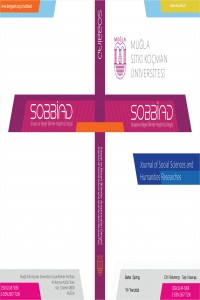Öz
James Graham Ballard’s The Drought is the third work in a trilogy of climate fiction novels published in the early 1960s. As the primary examples of climate fiction, The Drought stands out in the series as the novel in which the catastrophe is fully caused by human activities. Thus, suitable for ecocritical analysis, this article analyzes The Drought from a social ecological perspective in specific. Moreover, social ecology is a philosophy and movement that emerged from environmental activist Murray Bookchin’s theories within the second wave of ecocriticism. Thus, this article analyzes Ballard’s The Drought from a social ecological perspective and reveals the implications that the author foresaw concerning the future of our planet. While criticizing the motives that led to the devastating catastrophe, Bookchin’s alternative proposal to prevent a global climate crisis is also mentioned as a possible solution to maintain a harmonious existence with nature. In addition, the article also scrutinizes Bookchin’s forerunner Lewis Mumford and one of the most recent scholars, Daniel Stokols’ contributions to the theory of social ecology. To that end, it has been concluded that Ballard targets the capitalist world order by exposing the devastating consequences of a climatic cataclysm caused by excessive industrial activities.
Anahtar Kelimeler
Ecocriticism Social Ecology Lewis Mumford J.G. Ballard The Drought
Kaynakça
- Ballard, J. G. (1962). The wind from nowhere. New York: Berkley Medallion.
- Ballard, J. G. (2014). The drought. London: HarperCollins Publishers.
- Best, S. (1998). Murray Bookchin's theory of social ecology. Organization & Environment, 11(3), 334-353.
- Bookchin, M. (1982). The ecology of freedom: The emergence and dissolution of hierarchy. California: Cheshire Books.
- Bookchin, M. (1995). The philosophy of social ecology: Essays on Dialectical Naturalism. Black Rose Books.
- Bookchin, M. (2007). Social ecology and communalism. Oakland, CA: A K Press Distribution.
- Clark, J. (2000). A social ecology. Capitalism Nature Socialism, 8(3), 3-33.
- Clarke, J. (2013). Reading climate change in J.G. Ballard. Critical Survey, 25(2), 7-21.
- Eiglad, E. (2016). The concept of free nature in Murray Bookchin’s philosophy of social ecology [Unpublished Master's thesis]. University of Oslo, Oslo, Norway.
- Firsching, L. J. & P. R. M. (1985). J.G. Ballard's ambiguous apocalypse. Science Fiction Studies, 12(3), 297-310.
- Jerončić, E. & Willems, B. (2018). Vacuum ecology: J.G. Ballard and Jeff VanderMeer. Acta Neophilologica, 51(1-2), 5-15.
- Lejano, R. P. & Stokols, D. (2013). Social ecology, sustainability, and economics. Ecological Economics, 89, 1-6.
- Mumford, L. (1970). The Pentagon of power. New York: Houghton Mifflin Harcourt P.
- Mumford, L. (1970). The culture of cities. Orlando: Harcourt Brace Jovanovich Publishers.
- Rudy, A. P. (1998). Ecology and anthropology in the work of Murray Bookchin: problems of theory and evidence. Capitalism Nature Socialism, 9(2), 57-90.
- Sellars, S. & Hara, D. O. (2012). Extreme metaphors selected interviews with J.G. Ballard. London: Fourth Estate.
Öz
Anahtar Kelimeler
J.G. Ballard The Drought Lewis Mumford Ecocriticism Sociol Ecology
Kaynakça
- Ballard, J. G. (1962). The wind from nowhere. New York: Berkley Medallion.
- Ballard, J. G. (2014). The drought. London: HarperCollins Publishers.
- Best, S. (1998). Murray Bookchin's theory of social ecology. Organization & Environment, 11(3), 334-353.
- Bookchin, M. (1982). The ecology of freedom: The emergence and dissolution of hierarchy. California: Cheshire Books.
- Bookchin, M. (1995). The philosophy of social ecology: Essays on Dialectical Naturalism. Black Rose Books.
- Bookchin, M. (2007). Social ecology and communalism. Oakland, CA: A K Press Distribution.
- Clark, J. (2000). A social ecology. Capitalism Nature Socialism, 8(3), 3-33.
- Clarke, J. (2013). Reading climate change in J.G. Ballard. Critical Survey, 25(2), 7-21.
- Eiglad, E. (2016). The concept of free nature in Murray Bookchin’s philosophy of social ecology [Unpublished Master's thesis]. University of Oslo, Oslo, Norway.
- Firsching, L. J. & P. R. M. (1985). J.G. Ballard's ambiguous apocalypse. Science Fiction Studies, 12(3), 297-310.
- Jerončić, E. & Willems, B. (2018). Vacuum ecology: J.G. Ballard and Jeff VanderMeer. Acta Neophilologica, 51(1-2), 5-15.
- Lejano, R. P. & Stokols, D. (2013). Social ecology, sustainability, and economics. Ecological Economics, 89, 1-6.
- Mumford, L. (1970). The Pentagon of power. New York: Houghton Mifflin Harcourt P.
- Mumford, L. (1970). The culture of cities. Orlando: Harcourt Brace Jovanovich Publishers.
- Rudy, A. P. (1998). Ecology and anthropology in the work of Murray Bookchin: problems of theory and evidence. Capitalism Nature Socialism, 9(2), 57-90.
- Sellars, S. & Hara, D. O. (2012). Extreme metaphors selected interviews with J.G. Ballard. London: Fourth Estate.
Ayrıntılar
| Birincil Dil | İngilizce |
|---|---|
| Bölüm | Araştırma Makaleleri |
| Yazarlar | |
| Yayımlanma Tarihi | 30 Haziran 2020 |
| Gönderilme Tarihi | 29 Ocak 2020 |
| Kabul Tarihi | 19 Mayıs 2020 |
| Yayımlandığı Sayı | Yıl 2020 Cilt: 21 Sayı: 46 |
Sosyal ve Beşeri Bilimler Araştırmaları Dergisi (SOBBİAD) Creative Commons Atıf-GayriTicari 4.0 Uluslararası Lisansı CC BY-NC 4.0 ile lisanslanmıştır.


